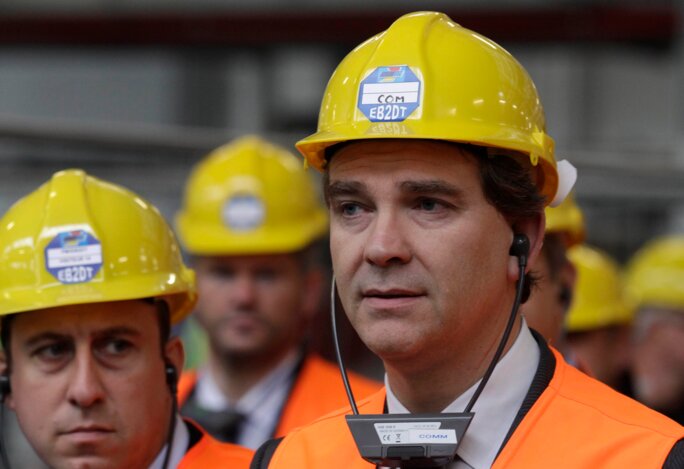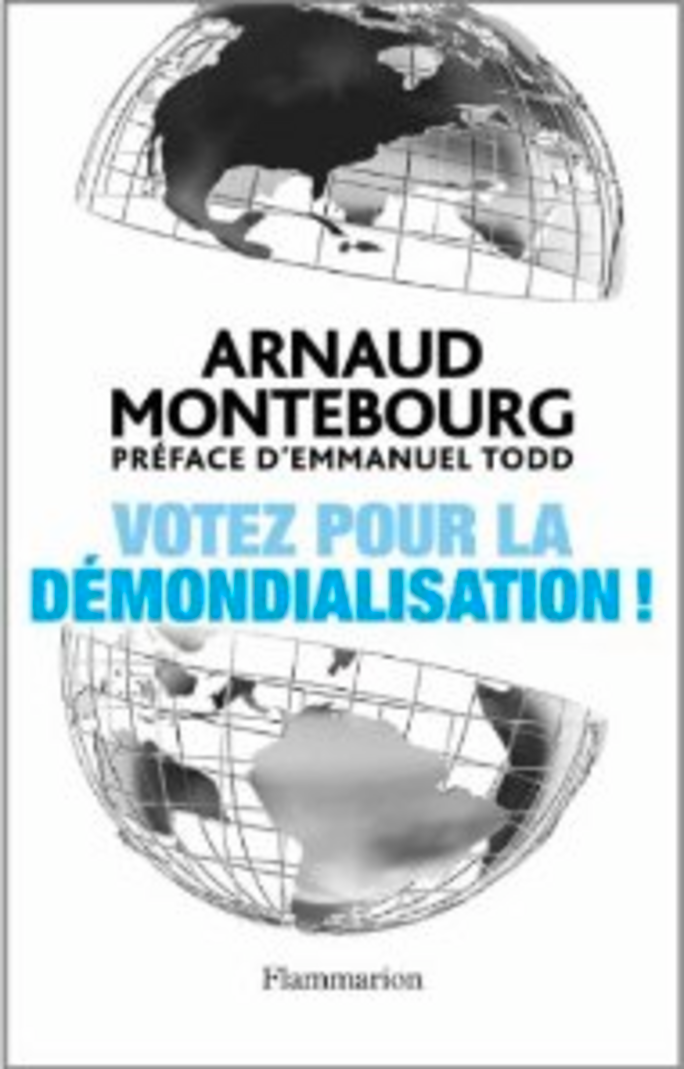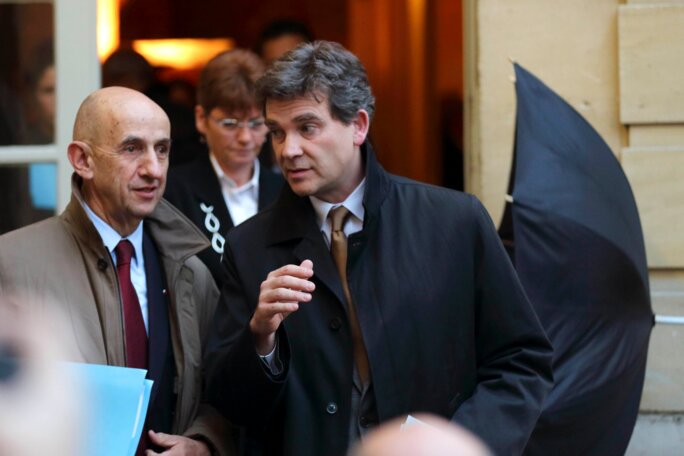A year ago Arnaud Montebourg, France’s Minister of Productive Recovery, a fancy title that corresponds broadly to the role of industry minister, was a contender to be the Socialist Party’s presidential candidate identified with the party’s left wing. The book he wrote to expound his programme was called Des idées et des rêves ['Ideas and Dreams'], and expressed his support for deglobalisation and protectionism.
Yet he is now ardently defending a report, published last Tuesday, which recommends slashing payroll taxes, a measure usually rejected out of hand by the Left. The report by Louis Gallois, the former chief of defence and aeronautical company EADS, was commissioned by President François Hollande to recommend ways of improving France’s competitiveness. Its key recommendation was to slash employer and employee social contributions by 30 billion euros.
"Every French person should read it. I suggested to the Prime Minister it should be brought out in paperback," said Montebourg two days after the report was made public with no apparent irony.
This apparent political shift, from critic of globalisation to advocate of cutting the cost of labour, could well alarm those who voted for him in the party’s primaries to pick the presidential candidate last year. They were often from the Left of the Socialist Party (PS), supporters of hard-left presidential candidate Jean-Luc Mélenchon or people politically nostalgic for Jean-Pierre Chevènement, a left-wing figure who split from the Socialist Party under President François Mitterrand in 1993. All were seeking a new champion for their ideas.
Montebourg’s political friends deny there is any contradiction in his position, but do admit there is room for misinterpretation. "There is some confusion around. The internal battles in the PS, including the primaries, put him on the left of the party with little difference between him and Benoît Hamon," said Paul Alliès, Montebourg’s right-hand man in the PS. "Yet with [his views on] the 6th Republic and deglobalisation, Montebourg takes a modernist position with a few classical Republican aspects, but he is not on the usual left-wing perimeter of the PS."
A member of Montebourg’s inner circle added: "On the Left of the PS people advocate the primacy of social issues over economic ones. Arnaud does the opposite. For him, social issues depend on the economy." And Bertrand Monthubert, who was Montebourg’s spokesman during the socialist primaries, says the minister occupies "a position in the centre of the PS".

Montebourg’s campaign last year, in line with the Left of his party, laid into the excesses of the financial sector and advocated a complete reorientation in building Europe. But even at the time he advocated a commonality of interest between producers, consumers and workers. And in his book he makes no mention of class struggle or overthrowing capitalism.
In the book Montebourg defends what he calls "cooperative capitalism […] a new alliance between producers, researchers, consumers and workers", saying this should create "a national mobilisation around our country’s industrial creativity." He defines producers as heads of small and medium-sized companies (SMEs), artisans and "captains of industry", whom he describes as "a threatened species" that needs to be protected from the likes of traders, shareholders and bankers.
"What this means is making the producer one of the reference points of this new society, one of the pillars of this new alliance, and to bring forth a new generation of captains of industry and entrepreneurs who are prepared to take risks, who will not be hesitant and will know that they will be encouraged, supported and lauded in France," Montebourg wrote.
And, as if to differentiate himself from the views of many renowned past figures on the Left of the party, he makes it clear he is not condemning wealth in itself. "It is not about making a case against money but against the lack of social usefulness of those who sit on piles of gold," he wrote.
These positions make it easier to understand his praise for Gallois as well as the fact he has met Jean-Louis Beffa, former CEO of glass maker Saint-Gobain, and Louis Schweitzer, former boss of Renault, on several occasions.
Industrial recovery and competitiveness: different words for the same concept?
So during the primaries last year Montebourg advocated not a return to socialist dogma but rather for moving to end political helplessness in the face of neo-liberal globalisation.
This can be seen as a reaction to the resigned approach typified by former Socialist Prime Minister Lionel Jospin’s declaration in 1999 following the announcement of Michelin’s plan to lay off 1,800 workers, that "the government cannot do everything". It is also a reaction against an idea that gained traction in the 1990s, that industry belonged to the 20th century economy and would inevitably decline in favour of services in the new century.
To his followers, Montebourg is above all a defender of political activism and the re-industrialisation of France. "In the primaries he wanted to get away from economic fatalism, and deglobalisation was a way of saying that there is a need to be armed with political tools," said Monthubert, Montebourg’s former spokesman.
From that point of view Montebourg, who was backed by left-wing academic figures such as historian Emmanuel Todd and who quoted "appalled economists" such as Jacques Sapir and Jürgen Habermas, has not in fact changed much.

Enlargement : Illustration 2

"François Hollande’s entire campaign, which Arnaud Montebourg actively nourished and contributed to, was based on the theme of industrial and productive recovery," said Aquilino Morelle, Montebourg’s campaign director during the primaries. "Putting the taboo on words to one side, that is exactly the same thing as competitiveness." Morelle is now a special advisor to Hollande and has just been elected to the PS’s national council as part of a quota of Montebourg allies.
It is also worth noting that since Montebourg became a minister he has argued for "a historical compromise between the CGT and the Medef" – the CGT being one of the biggest French trade unions and the Medef the main French employers’ organisation. This position is in line with the "new alliance" he argued for during the socialist primaries.
According to Alliès, Montebourg’s approach follows the German model involving consensus in seeking to "win enough respect from the unions and the bosses to achieve re-industrialisation." This is also reminiscent of Chevènement’s position in his post-Mitterrand days.
Nevertheless, Montebourg has never put cutting labour costs at the centre of his strategy, either during his campaign or in his writings. Yet this is one of the central tenets of the "competitiveness pact" announced by Prime Minister Jean-Marc Ayrault last Tuesday in response to the Gallois Report.
The pact involves 20 billion euros in tax relief for companies to be financed by cuts in public spending, a rise in VAT and green taxes. It amounts to a transfer to companies from households.

Yet in a pamphlet (right) published during his campaign entitled Votez pour la Démondialisation ('Vote for Deglobalisation'), Montebourg criticised what he termed the German “anti-model” which has “impoverished employees” and neighbouring countries, including France. He also denounced governments of both Left and Right which had followed the same “global race” to be the lowest bidder as far as fiscal policy is concerned.
"Reductions in taxes and social security contributions [taken] from the profits of companies, fortunes, wealth and comfortable revenues have multiplied in a suicidal race for attractiveness," he wrote at the time. "The companies in the CAC-40 [France's Stock Exchange] are extracting all possible lightening of charges thanks to their blackmail […] so that with the government’s complicity, these companies have become Robin Hoods in reverse, taking from the pockets of SMEs and employees so as to support their shareholders."
A negotiator and pragmatist as minister
A year on, Montebourg’s political allies are embarrassed when reminded of this rhetoric. The response of many of them is to point out that his main achievement has been to ensure that industrial issues are at the heart of the government's concerns. "What matters is that the government is intervening in the economic arena," said one. Whatever the price. Other allies note that he put forward some alternative sources of financing for increasing French competitiveness, some of which were eventually chosen by the government.

Enlargement : Illustration 4

A year on, Montebourg’s political allies are embarrassed when reminded of this rhetoric. The response of many of them is to point out that his main achievement has been to ensure that industrial issues are at the heart of the government's concerns. "What matters is that the government is intervening in the economic arena," said one. Whatever the price. Other allies note that he put forward some alternative sources of financing for increasing French competitiveness, some of which were eventually chosen by the government.
In a memorandum dated October 16th, Montebourg’s proposals for financing the 20 billion euro cut in payroll taxes included taxing the banking sector, a tax on the wealthiest retired households and reforming family allowances to make them more closely linked to income. These proposals were not adopted. And he did not suggest an increase in VAT. However, the pact did include his proposals for cutting public spending, taxing restaurants and property and an ecological fiscal policy.
Although Montebourg believes it is essential to give companies a boost in the current circumstances because they have suffered from falling profit margins, his belief is that this must also be matched by commitments on the employers' side. These include safeguards and conditions over investment and employment in particular. These, he says, are important pre-conditions for such a move to be “socially acceptable”. But they are exactly the points the government did not accept when announcing its policy.
But then, Montebourg is neither prime minister nor president, his inner circle is at pains to points out. "He wins some negotiations but he has not got everything he sought," said Alliès, Montebourg’s right hand man in the PS. "Montebourg is fundamentally a pragmatist. For him, the slightest advance can enhance and legitimise his position."
His pragmatism has come to the fore since he became a minister, his closest allies say. "He is a bit different from before," said one. "He has refined his thinking on becoming a minister."
"The campaign and the ministry are two different things," said a party official who knows Montebourg well. "The primaries were about liberty and openness. The government is about seeing what you can do in the face of reality, while remaining loyal."
------------------------------------------------
English version: Sue Landau
Editing by Michael Streeter


